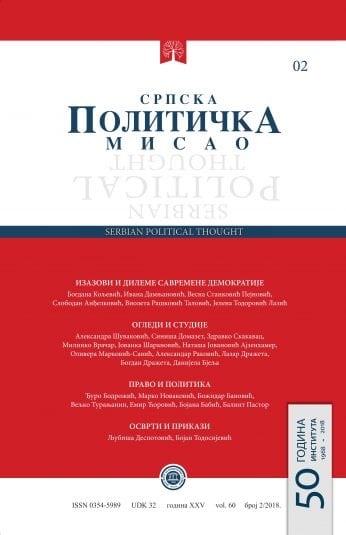Косово и Метохија као индикатор новог биполаризма
Kosovo and Metohija as an Indicator of the New Bipolarism
Author(s): Milomir StepićSubject(s): International relations/trade, Geopolitics
Published by: Институт за политичке студије
Keywords: geopolitics; secessionism; pro-atlantistic and anti-atlantistic bloc; new bipolarism; Kosovo and Metohija
Summary/Abstract: The United States demonstrated its global hegemony and proved the existence of the unipolar order by military and political engagement and by supporting the secessionism of Albanians in Kosovo and Metohija in 1999. After the self-proclaiming of the so-called independent Kosovo in 2008 and with the leadership of the West, more than half of the states in the world recognized this act. The process of recognition can be divided into four phases. The first phase (during 2008) is characterized by the ‟explosion” of recognition. During the second cycle (2009‒2013) driven by inertia, relatively numerous acts of recognition continued. There was a slowdown in the third phase (2014‒2016) and even several withdrawals of recognition occurred in the fourth phase (from 2017 onwards). The alternation of the process of recognition has had a causal effect on the termination of the absolute unipolarism, i.e. on the relative weakening of the US and the EU, and the strengthening of Russia, China and other global and regional powers. In this context, a specific form of geopolitical alignment has emerged: states that recognized the so called independent Kosovo form the pro-atlantistic group, and those who did not – the anti-atlantistic group. Thus, Kosovo and Metohija has become an indicator of the new bipolarism, within which two antagonistic blocs determine the future of that part of Serbia. In order to confirm its credibility as a world leader, the United States promotes a ‟quick solution” that implies Serbia’s compliance with the so-called independent Kosovo’s membership in the UN. On the other side, Serbia, with the support of Russia and China, could postpone the final solution, advocating the concept of ‟frozen conflict” waiting for the moment when it will be in a better international position.
Journal: Српска политичка мисао
- Issue Year: 2018
- Issue No: 3
- Page Range: 27-49
- Page Count: 23
- Language: Serbian

